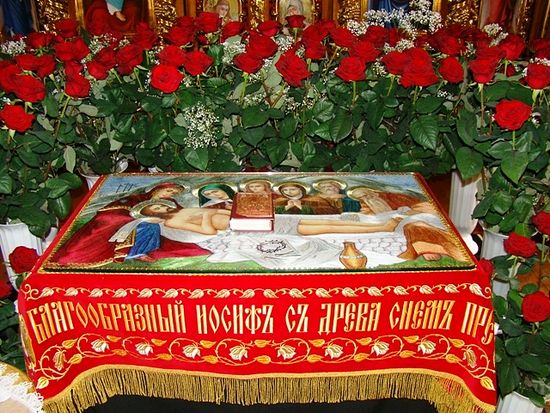 The epitaphion, in Russian plaschanitsa, or symolic winding sheet of Christ.
The epitaphion, in Russian plaschanitsa, or symolic winding sheet of Christ.
Because of its God-given survival and God-inspired expansion throughout what is called "the diaspora," Orthodoxy continues to preserve, proclaim, and celebrate the truth about God and about ourselves. More than any other expression of Christian faith, it enables us to know God, to celebrate His saving work, and to participate in His very life. To borrow the expression of St Innocent Veniaminov, Orthodoxy does nothing less than indicate to us and guide us along the Way that leads to the kingdom of heaven.
That way, nevertheless, includes an aspect that is particularly difficult to preserve and cultivate in modern American society: an aspect expressed most eloquently in the Entrance Hymn of the Divine Liturgy of Holy Saturday, borrowed from the Liturgy of St James. On that day, we sing with solemn anticipation words that express awe,"fear and trembling" before the ineffable mystery of the death and coming resurrection of God's eternal Son.
Let all mortal flesh keep silence, and in fear and trembling stand, rendering nothing earthly-minded. For the King of kings, and the Lord of lords, comes to be slain, to give Himself as food to the faithful!
In the usual celebrations of the Divine Liturgy, we exhort ourselves and one another to "lay aside all earthly cares," in order to receive "the King of all." On Holy Saturday, as we commemorate Christ's repose in the tomb and His descent into the realm of the dead, we recall the price paid for our own liberation from death and corruption. We declare that He, the preexistent divine Son of the Father, came into our world and into our life for one purpose: to die, that through His death we might have life, lived in eternal communion with the Holy Trinity.
There is nothing in human experience, nor even in the human imagination, that could offer greater promise and greater joy than this central message of the Christian gospel. Yet for most of us, the most familiar and painful aspect of our lenten journey is likely to be our inability to relate to that message to that extraordinary promise in a way that actually changes our life. Distraction, dispersion, and chaos, whether from outside or from deep within our own psyche, exercise their demonic influence in every phase of our daily life, while we are at work, with our friends or family, or in a liturgical service. And so we live our lives on the surface, feeling little and caring little for what is in fact the one thing in this world that really matters, the one thing that is truly needful.
Holy Saturday calls us back to what is essential. In the Entrance Hymn especially, it reminds us that our life is a battle ground, where a constant struggle pits us against the Enemy, against the worst inclinations of our fallen nature. Appropriately, it calls us to engage in that struggle with fear, with trembling, and in silence.
One of the great teachers of Orthodox tradition, the fifth-century mystic, Diodochos of Photiki, captured the vital link between inner silence and spiritual warfare with these words:
Spiritual knowledge comes through prayer, deep stillness and complete detachment. . . When the soul's incensive power [thymikon, spiritual wrath] is aroused against the passions, we should know it is time for silence, since the hour of battle is at hand.*
At the close of Holy Week, as we journey with our Lord toward His resurrection, we hear once again in the words of the Great Saturday Hymn of Entrance an invitation to enter into that silence: silence which is essential if we are to assume with real faithfulness the ascetic struggle that characterizes our entire "life in Christ."
In that silence we stand in holy awe before the King of kings and Lord of lords. For a few moments we move beyond the superficiality of our social and cultural existence: the noise, the distraction, and the pointlessness of our daily routine. By the grace of God we discover at least a minimum of "prayer, deep stillness, and detachment." In that stillness in the silence granted to our mortal flesh we contemplate the unfathomable depths of Jesus' sacrificial love, for ourselves and for all mankind. And "with fear and trembling" we receive Him as eucharistic food, the Bread of heaven, which nourishes us to eternal life.
From God With Us: Critical Issues in Christian Life and Faith, by Fr. John Breck


